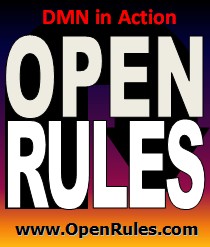Open Your Business Rules!
Rules-based
Operational Decision Services
OpenRules Classic: Decision Management Methodology
OpenRules has been successfully applied as a foundation for real-world Decision Management Systems. OpenRules covers all major phases of the Business Rules and Decision Management from modeling to testing and execution.
Goal-Oriented
Decision Modeling
OpenRules®
supports a goal-oriented approach to decision modeling. This
approach aims to creation of complex decision models
that cover certain business domains and capable to
reach not just one but multiple business goals by providing
answers to various questions in terms of automatically
calculated decision variables. Such decision models can be
designed by defining hierarchies of business goals and subgoals with relationships between them described in
business-friendly decision tables. Without asking a human decision modeler to
specify knowledge and information relationships within the
model, the OpenRules Engine can automatically calculate an execution path
within the decision model that leads to any business goal
selected by a user.
Watch these
videos that explain the OpenRules methodological approach:
-
Building and Executing Decision Models with OpenRules-7
-
Goal-Oriented
Business Decision Modeling with OpenRules.
OpenRules
also supports the
OMG standard "Decision Model and Notation (DMN)
and a methodological
approach described in the popular book "The
Decision Model".
OpenRules
supports cooperative work between Business
and Technical Analysts, providing business people with
control over the business logic.
In contrast with most
commercial rule engines that provide
an Excel-like graphical tool for Rules and Decision Management,
OpenRules
uses MS Excel® or Google Sheets® directly as
rules editing tools.
OpenRules allows both business and technical people to
accomplish rule and decision modeling, automation, testing, and
integration using only popular and commonly known
tools.
Without any coding, business analysts can
create test cases in Excel and can actually EXECUTE their
decisions in order to TEST if the expected results are being
produced. OpenRules generates HTML-reports that
explain why certain decisions were made. OpenRules
provides a graphical “Decision
Model Analyzer”
freely available online from
here. Its main purpose is to
allow a business user to execute and analyze predefined decision
models and to allow business people to add, execute, and
analyze their own models.
Being
integrated with
Google Sheets®, OpenRules supports
collaborative rules and
decision management.
The use of standard tools gives our customers easy access to very powerful features including editing, searching,
discussing, and integration capabilities.
The distinctive feature of OpenRules is that "everything is real". There are no documents for the sake of documents. Decision models are "executable" and can be tested at any stage of the decision management process.
IT specialists can easily integrate decision models created by business analysts into their existing applications by mapping business glossaries and business object models without any changes in the business logic. Business Rule and Decisions administrators can use the standard MS Excel protection mechanism to provide different groups of people with proper access rights to the rule repository. Both technical and non-technical users will appreciate the power of the Excel-Java combination supported by OpenRules.
By providing support of Rules-based Web Dialogs, OpenRules expands the BR approach by giving business people control over the presentation logic as well. You can model your rules-based business process using Excel as a powerful web form management tool. With OpenRules libraries, you can define layouts of your web pages and relationships among them directly in Excel. A non-technical user can implement dynamic web-based graphical interfaces without any knowledge of HTML, JScript, PHP, JSP, or other popular web development technologies. You can also add decision tables to control complex interaction logic. In this way Excel can be used to model and execute dynamic web-based interaction processes.
OpenRules approach uses open source Eclipse, the de-facto standard project management tool for software developers, as a powerful IDE for rule integration within a Java-based development environment. Complex Java projects with extensive rules components can be organized and maintained under Eclipse with the OpenRules Plugin. Eclipse naturally provides a powerful version control mechanism for Excel-based rules and related source code files. Eclipse is used for code editing, debugging, and testing of rule projects. With OpenRules Plugin business rules can be deployed as a Web Application or a Web Service and can be integrated with any Java or .NET applications.
Note. Does the
use of MS Excel mean you are doomed to use MS Windows only?
Not at all!
You do not need Excel to run(!)
OpenRules-based decisions. For
example, your Java-based application can run under Unix
or Mac OS using xls-files as regular data files. Additionally, one may
prefer to use
OpenOffice or
Google Docs to create and edit xls-files rather
than MS Excel.

